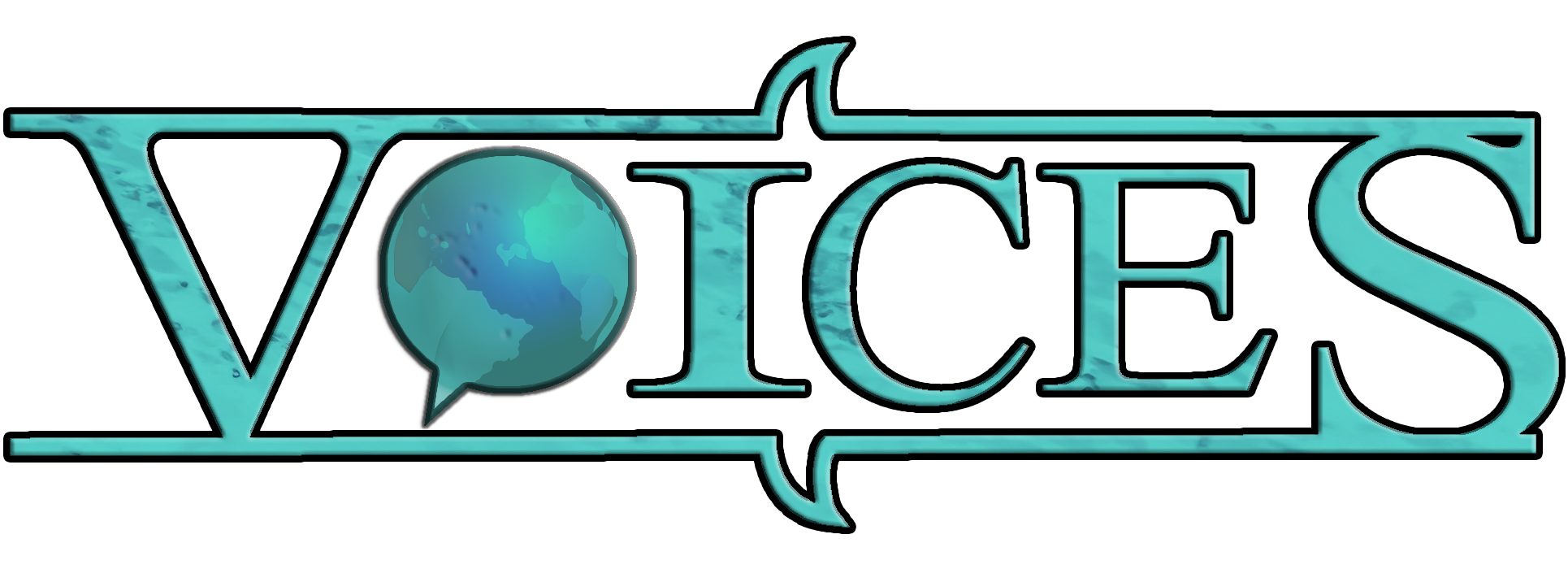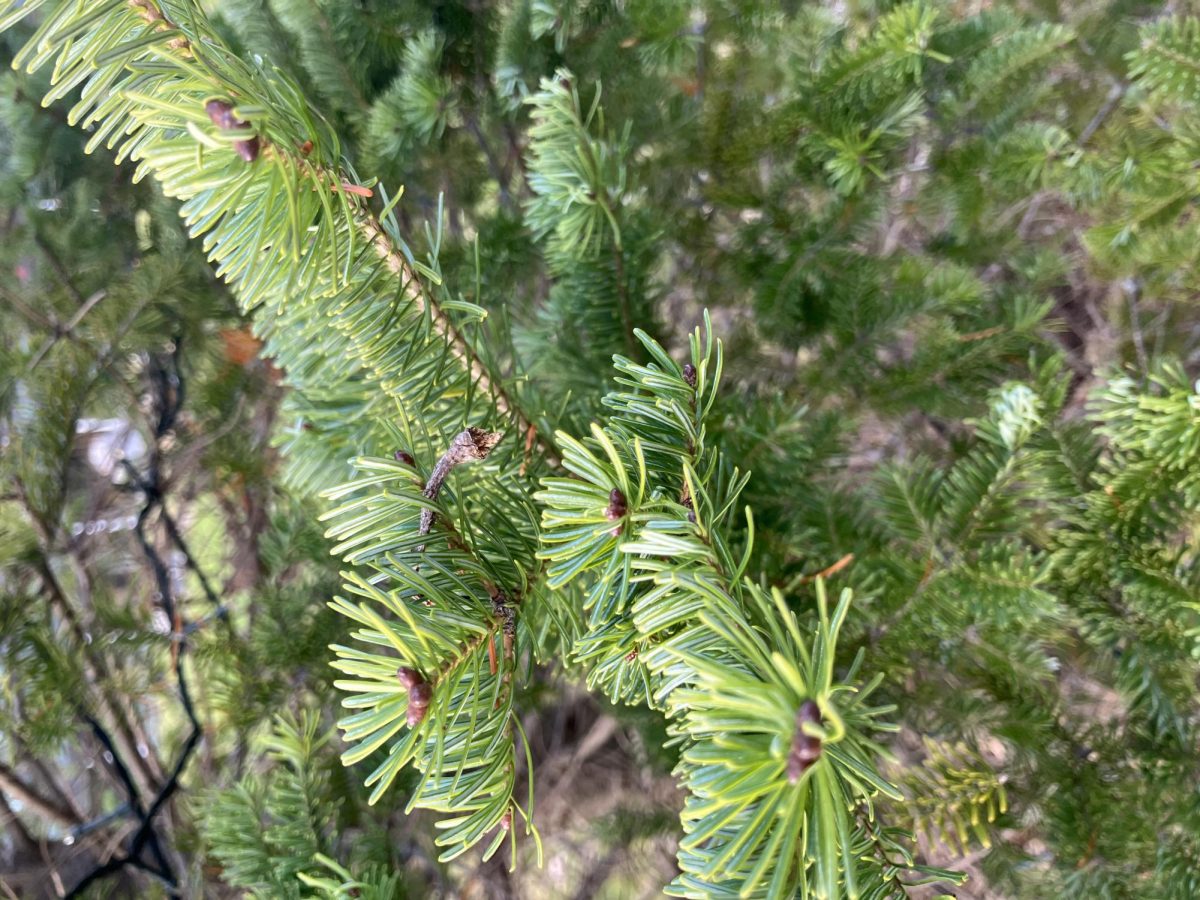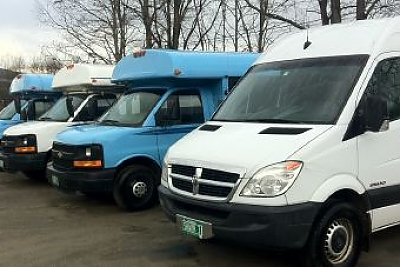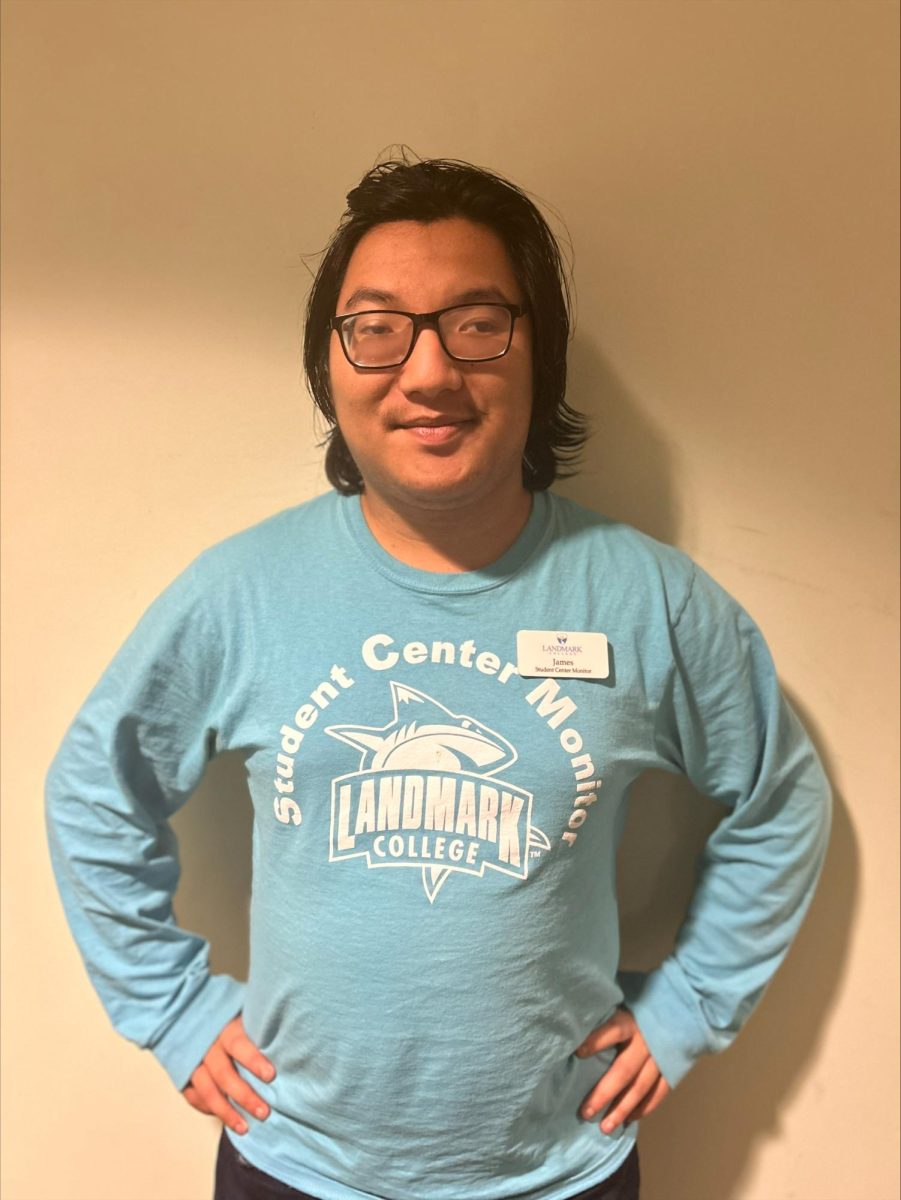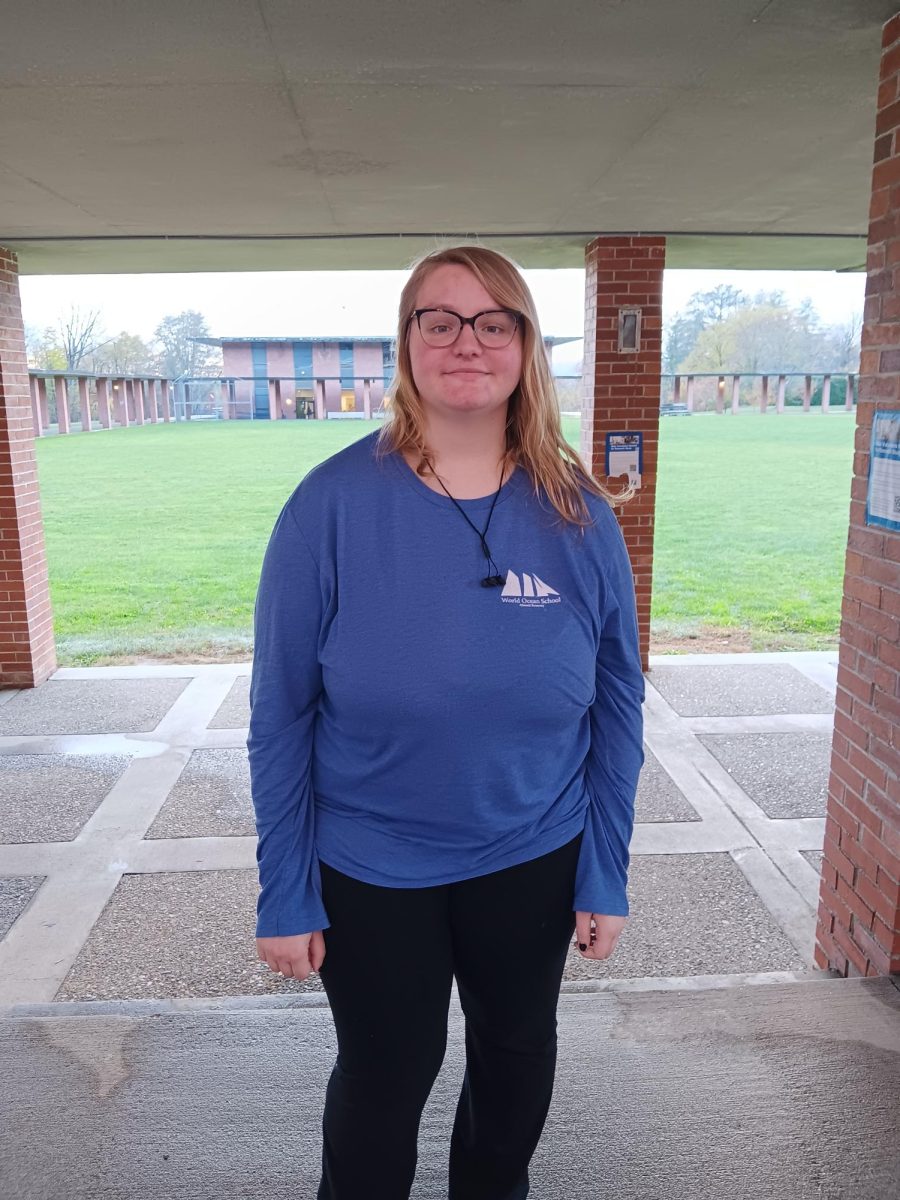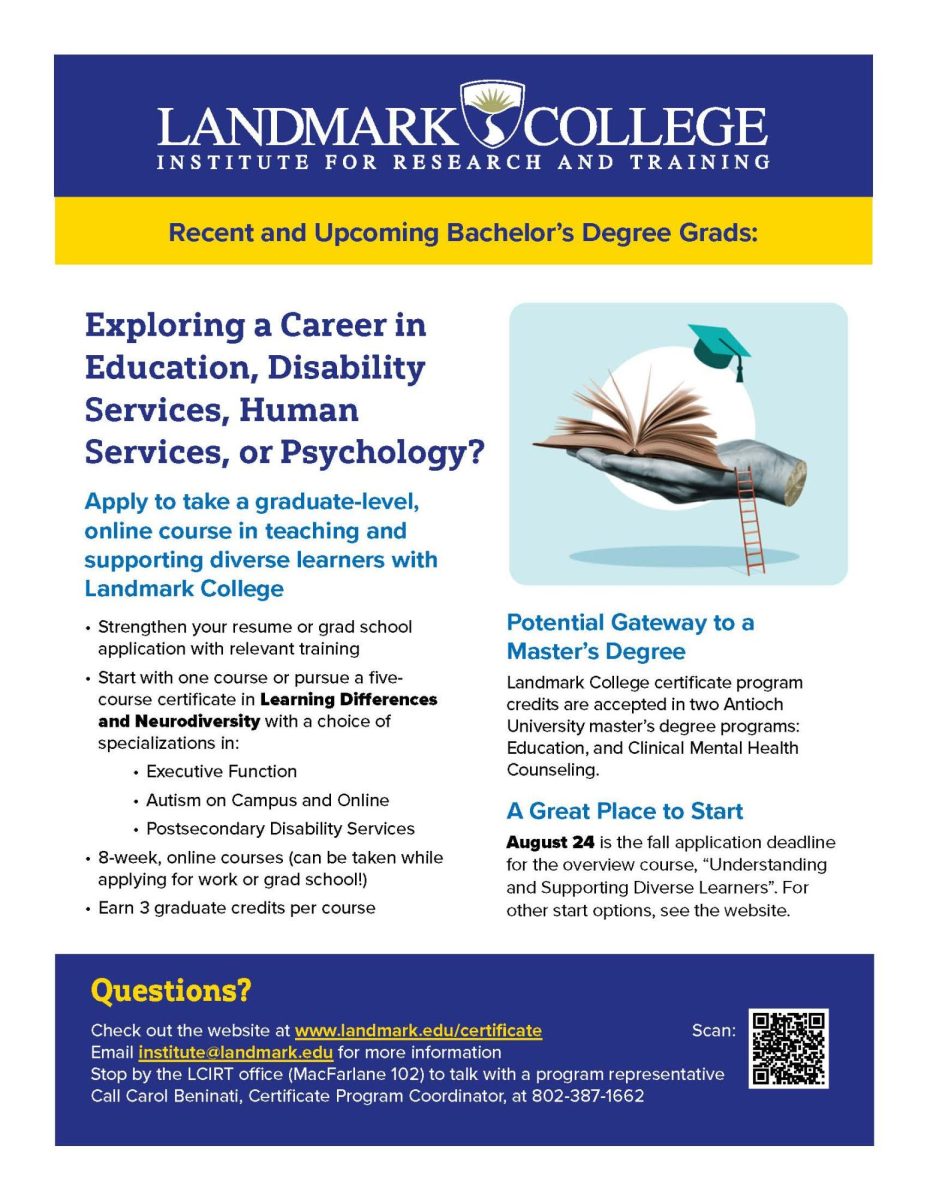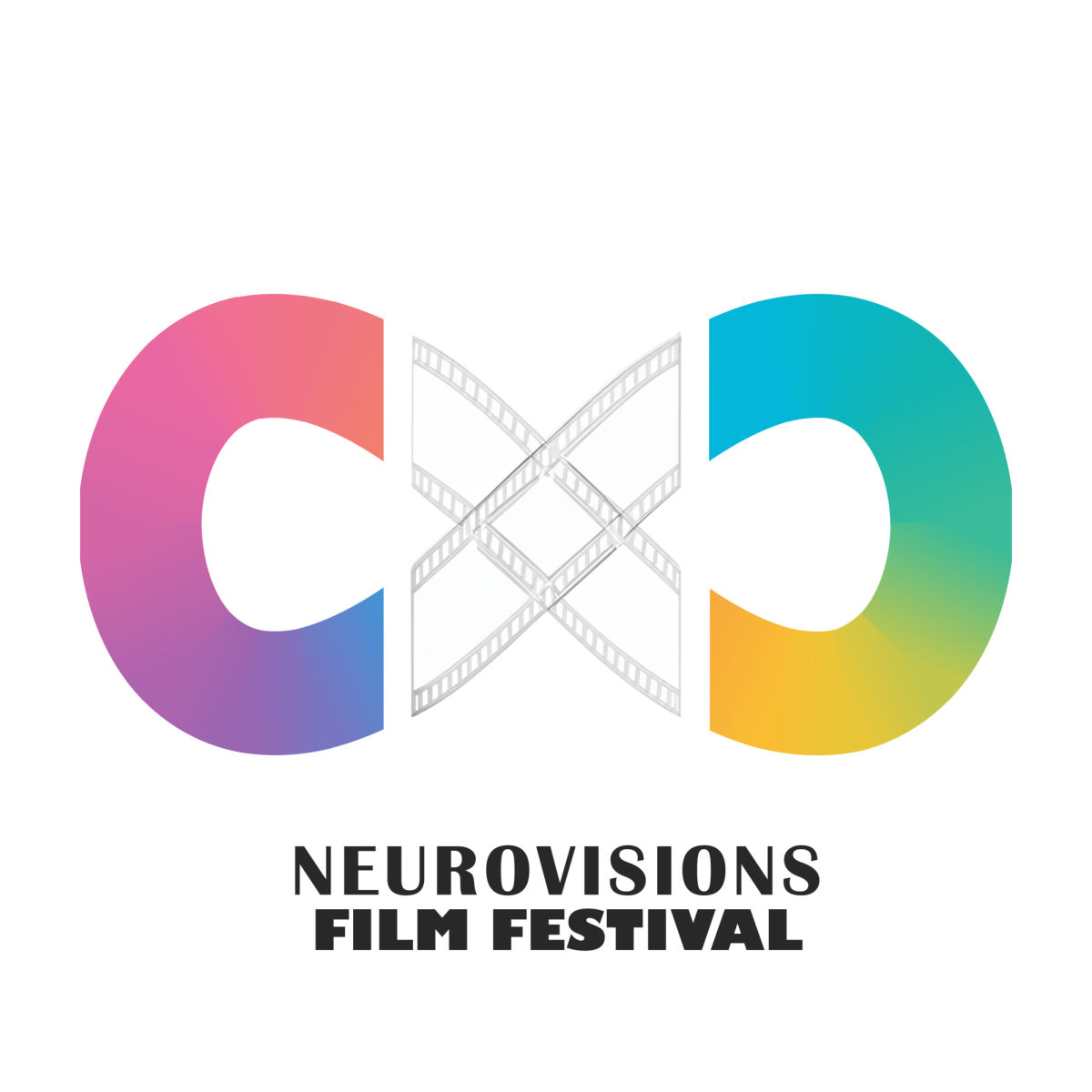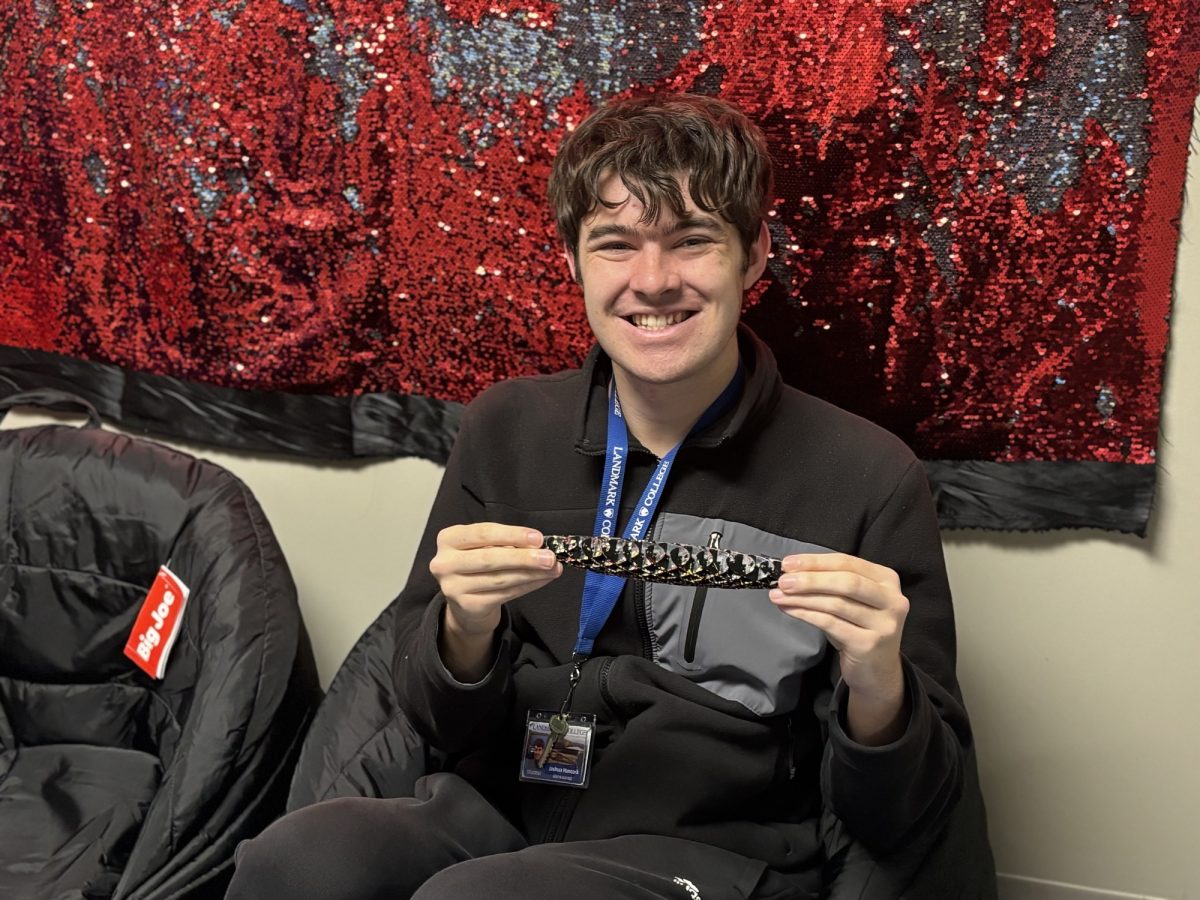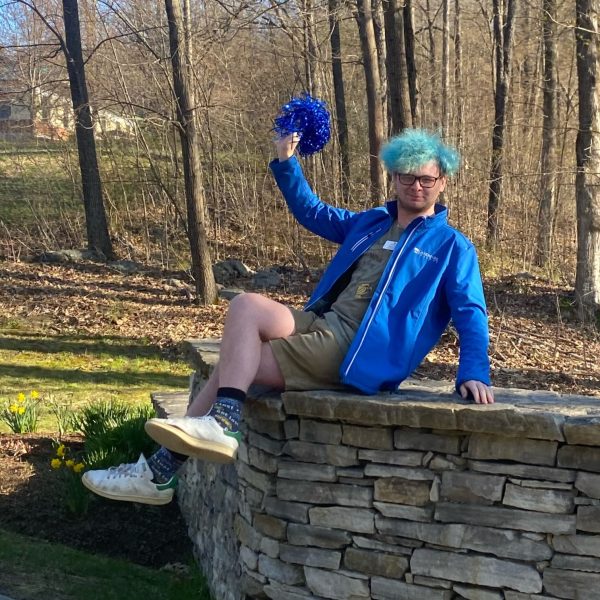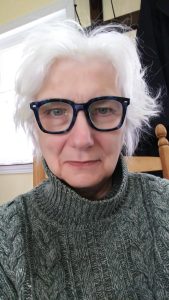
Mickey Cronin is the Director of Social Pragmatic Programs and Support here at Landmark College. Mickey has been working at the college for over a decade as an Academic Advisor, and in the last year as a member of the Social Pragmatics team. She has authored many curricula, including for the Landmark College Institute for Research and Training, about working with students with autism. She is also the co-author of The Essential Six, a book about Self-Advocacy for neurodivergent college students. I sat down with Mickey to talk about her experiences at Landmark and what she has planned for the department in the future.
[TRANSCRIPT OF INTERVIEW]
What is it like working for Social Pragmatics?
Well, it’s a lot of fun. Andy and I always work together collaboratively, so while I miss not having Andy here because we always had a lot of fun at work, it is fun that I have been able to work with Isaac and Gus as a team along with TK in managing the department.
What is it like working with TK?
It’s always fun to be working with someone who’s so far away in Australia, you know, and TK has such great energy that, it’s fun too and because there’s such a difference in our ages. There’s a lot of interesting generational interpretations of different social cues and activities and language that we work with each other to understand, and especially, you know generational, I mean that’s pretty interesting because we’re talking about things like Facebook versus like TikTok or, you know, different things that we differ about. And when we talk about different things, we often have to interpret. Oh, what is that, you know? Like with Discord, that took a little a moment to figure out; what the Discord server was and how that was used. So, there’s all these evolving social aspects that it’s interesting learning and sharing. It’s a lot of fun.
How is working with someone who is neurodivergent?
When working with someone who is neurodivergent, you know creating a space that is open to people asking questions, clarifying, making sure your communication style is clear, being willing to answer questions that come up. Just being aware and being thoughtful can be really helpful.
What is next for Social Pragmatics at Landmark College?
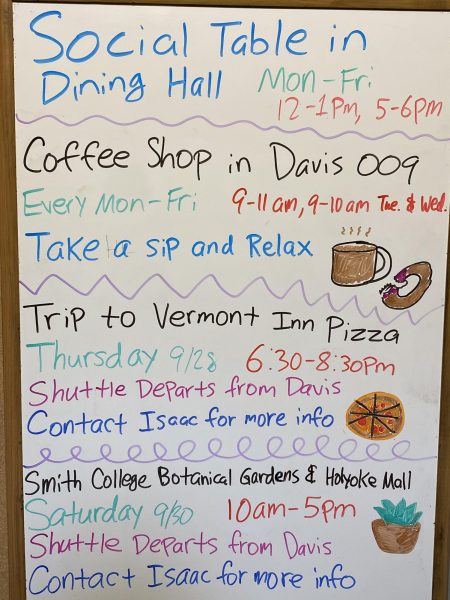
Well, Andy developed the department and so it there are a lot of strengths and we’d like to keep moving forward on that, so that might mean continuing to expand our staffing, continuing to expand our offerings in terms of program, to see growth beyond the work that we’re doing now. I think you could see us taking up maybe a little bit more space in the basement of Davis Hall, that would be great and expanding our work with families and parents. So all that’s yet to happen. One of the things would be expanding our online offerings. We have very popular programs. Minecraft Monday is a huge event. Jack Box Thursdays are anime watch parties. Any of the watch parties that we have going on and as well as our on campus and off campus events, we just did a trip last week to VINS. That was the Vermont Institute for Natural Science. It’s very popular. We’ve been continuing to explore the areas of Vermont and New Hampshire; those are some of our new trips.
How did you start off at Landmark as an Academic Advisor?
Advising that Landmark has always been a really important entity in supporting student academic success, but advising as you know, reaches out to all aspects really of a students life on campus and it’s always been a collaborative process. Even though I’m not an advisor anymore, I work very closely with advising. And so, advisors work with Res Life, Student Affairs, academic support, and families too. So, it’s a really involved role on campus.
How did you end up in Social Pragmatics?
That’s a great story. When I was settling into my role as an academic advisor at Landmark, I kept noticing students on campus that needed more social support. So I started investigating, and asking questions like: do we have students with autism on campus? How many students on campus identify as autistic?
I’m the parent of someone who’s autistic, and that got me wondering about what kinds of social supports would be helpful at Landmark. Luckily, there was another person on campus who was interested in asking the same kinds of questions. That person? Andy Donahue. So, we started talking. Andy and I used to host events on campus: on Saturday nights, we did movie nights and pizza parties. From there, we expanded to making social groups.
When I think of our first social group, I think of where we met. We met in my old advising office, which was on the second floor of the Edmond building. And where the Center for Neurodiversity is now. Andy and I hosted game nights up there; Apples to Apples became a game staple. And along the way, Andy and I became good friends: we’ve been good friends for about seventeen years now.
How did Social Pragmatics expand out of the Student Center basement?
Well, Andy was a key person to make that happen. I mean, many of the students that we were working with are living in Davis, and so Andy asked for a space in Davis Hall so we could have better access for students and, you know, be able to reach out to students more. And Student Affairs very generously gave Andy a spot for social pragmatics, and as you can tell, it’s grown. It’s grown and that’s really fabulous. It’s nice being up in the upper campus and you’ve probably noticed that there are a lot of advising offices up on upper campus too. It’s nice to be able to have that access for students. It’s much easier to come visit the social pragmatic offices or to take peers when it’s in your in your dorm. And the same is true for advising, you know, being more accessible to the student, and that’s what’s important.
Can you tell me more about PEERS?
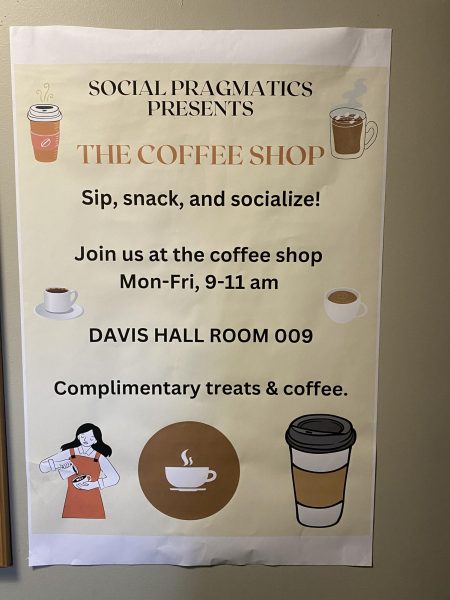
Oh, PEERS. Well, we know that PEERS is an acronym, and if I get it correctly, it’s the Program For the Enrichment and Education of Relational Skills, developed at UCLA by Doctor Elizabeth Loggins, and there is a PEERS clinic at UCLA. I am trained. Isaac is trained. Andy was certified in teaching PEERS. Not just anyone can teach PEERS. So, we’ve taken the training and PEERS really focuses on steps and rules–so very concrete–about ways to start friendships, start conversations, deepen and maintain friendships, find social groups, and to be able to manage conflict in relationships and friendships. Dating is a big one. We offer dating boot camp.
One of the key things about PEERS is that it’s highly researched and that’s one of the reasons we went with the program; research has been done on PEERS for the last 15 years and has been researched in the context of young adults with autism, ADHD, traumatic brain injury, and overall the outcomes have been very good. So, because of that, that’s why we go with PEERS here at Landmark.
What do you see when it comes to Landmark students’ approach to dating?
That’s a complex question, so the PEERS approach is very concrete, right? Steps and rules. So, we look at different aspects, like how to tell someone you like them. That can be really complex, and what are the social signals that someone might be interested in dating you?
But also keeping in mind that through PEERS we always say you have to be a friend before you can be more than a friend, and sometimes that step gets eliminated or not addressed and how important it is to really focus on friendship before even thinking about a romantic relationship.
The other program that we offer is HEARTS, which focuses on healthy relationships and is slightly more nuanced. That really focuses on more complex issues, things like boundaries that are really important in relationships, knowing what is a reasonable conversation to have with someone. You’re in a relationship yet you know, thinking about how have you’re reflecting on how have your past relationships gone, and what would you do differently? Conversation, communication in relationships.
All these are important aspects to, you know, being able to think about. Being in a relationship is kind of, you know, a further down the line step. The first one is how can I be a friend? And reminding people, reminding students that that’s where you start. And we know that through PEERS that friendships are based on common interests. So, if you’re thinking about a romantic partner, think about what your interests are, what their, what your common interests are with the other person, and the activities that you like to do together. Because that’s where, again, where relationships start; as activities that you like to do together.
What impact have you seen on our students?
One of the things I notice is that more and more students are participating in our activities, our trips, the social table. People rely on those. Being able to come to PEERS and even if you’ve already taken PEERS once, and if you think you need a refresher or working as a PEERS assistant. One of the things we’re very interested in building right now is more PEERS assistants, and so if students are interested in taking PEERS and then staying on and working as a PEERS assistant, that’s a paid position here on campus.
And we encourage students who enjoy doing the PEERS work to think about staying on and working with us. We also have, as I said, the social table. Students rely on the social table as a as a fun place to hang out and talk to people and see your friends. And it is also being able to play jackbox games, or going to Smash Hour on Fridays. You know, those have become sort of casual institutions here on campus. Minecraft Monday, you know, those are all big events. So, I think that, and I hope that, we have helped students find friend groups on campus, make friendships and deepen friendships and. You know, they continue their social growth here.
Closing thoughts, what do you want people to remember?
I want people to remember that Social Pragmatics is a very accepting place. You know, it’s a very accepting department and if you have questions or you’re feeling like you want to work on some of your relational skills, that is the place to go.
And even if you don’t, knowing that we have events and activities that you may find kindred spirits. People that have similar interests as you. I think it can be really important, but a couple of things from PEERS that I just want to end with. And that is one, that we got to remember that friendship is a choice. And we can’t be friends with everyone, and everyone can’t be friends with us, and also that you have to be a friend to be more than a friend.
In a dating situation, always think about what you have in common with someone. From there, you can ask questions like: what are our common interests? What are activities on campus we can do together?
There’s lots going on here. Take a look at the different clubs, the Center for Diversity and inclusion, the radio station. Areas that offer activities you enjoy are also really important: they’re often a step towards finding your friend group.
